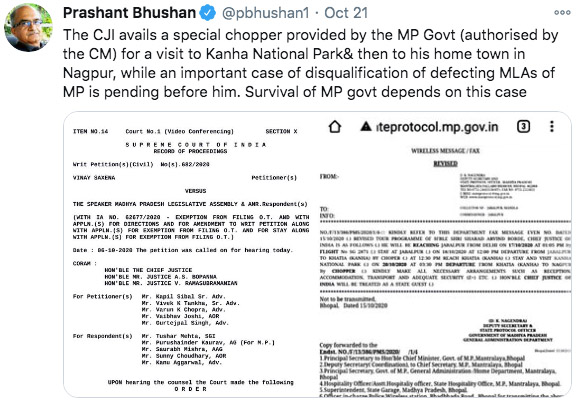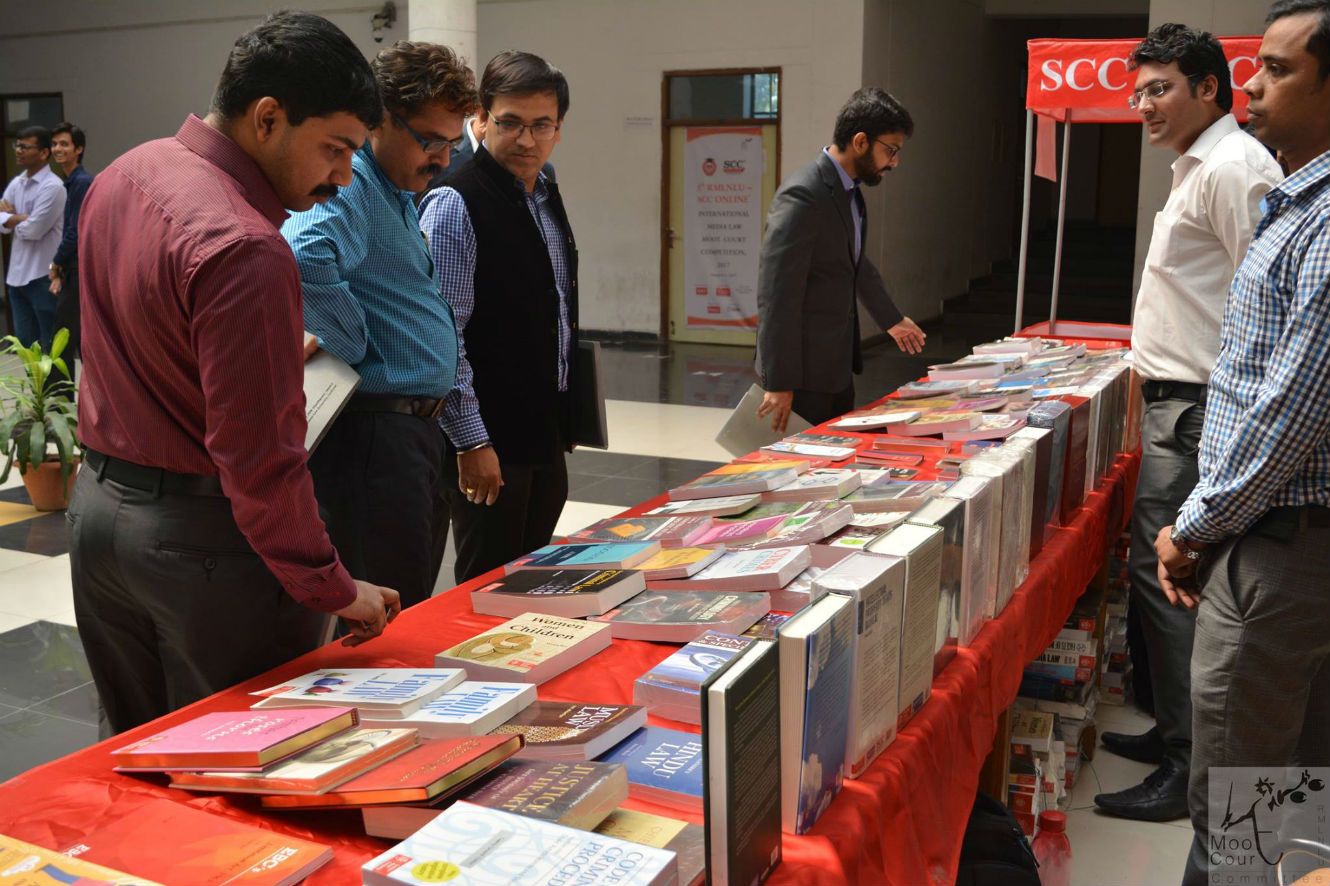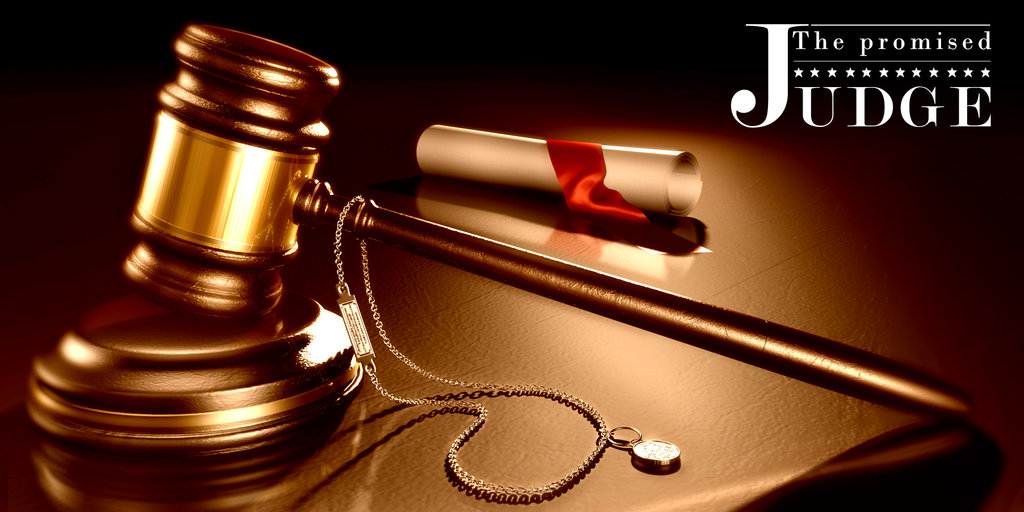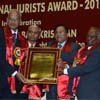



YOU ARE HERE : HOME >>>> >> >>Advocate and Lawyers Offices News Story
Bhushan tweeted - CJI S. A. Bobde's trip to Kanha & Nagpur: Is State Govt Hospitality Compatible With Judge's Code of Conduct?

Chennai/New Delhi, October 22, 2020: Lawyer Prashant Bhushan on Wednesday tweeted that Chief Justice of India S. A. Bobde had travelled by a chopper provided by Madhya Pradesh government to visit the Kanha National Park and then to his home town in Nagpur, while an important case of disqualification of defecting MLAs of Madhya Pradesh is pending before him. Survival of Madhya Pradesh government depends on this case,when the judge was hearing a case on which the fate of BJP government in the state hinged.
On October 21, lawyer and activist Prashant Bhushan tweeted:
that “The Chief Justice of India S. A. Bobde avails a special chopper provided by the Madhya Pradesh government (authorised by the CM) for a visit to Kanha National Park & then to his home town in Nagpur. Accordingly Justice Bobde reached Kanha, known for its tigers, on Sunday (a holiday for the court) and left on Tuesday. The court had closed for Dussehra holidays from Monday and will reopen next week. "
However, a source familiar with the Chief Justice said no undue step was taken. The source said the Chief Justice was “entitled to a chopper, a car, an aircraft and other special facilities in view of his constitutional status”. The source added that Bhushan’s tweet was mala fide and motivated to denigrate the highest judiciary as part of an orchestrated campaign.
According to official sources, Chief Justices of India enjoy a unique constitutional status and have access to such privileges. It’s up to the incumbent to decide on using the facilities.
“Moreover, the CJI has Z-plus security, and for security reasons he has a right to such facilities. Supposing he travels in a state government car, will it also be questioned?” a source asked. “If the CJI can travel by government car, then why not a chopper for security reasons?”
The source added: “I don’t see what’s wrong with it. Madhya Pradesh is also infested with Maoists and the CJI has a threat perception. Every state, Union Territory and the Centre is a litigant in the Supreme Court. By that yardstick, neither the CJI nor any of the judges can utilise any government facilities.”
The government of the state that the CJI is visiting has the responsibility of making travel and logistical arrangements.
The sources said “appropriate action would be considered against Bhushan”.
The Supreme Court bench headed by CJI Bobde is hearing a case filed by a Congress MLA against the Madhya Pradesh pro-tem Speaker’s decision to dismiss a disqualification petition he had moved against 22 lawmakers from the party. The Congress MLAs had defected to the BJP to bring down the Kamal Nath government and prop up that of Shivraj Singh Chouhan.
On October 6, a Supreme Court bench headed by CJI Bobde and including Justices A.S. Bopanna and V. Ramasubramanian had agreed to examine Madhya Pradesh Congress MLA Vinay Saxena’s appeal challenging the pro-tem Speaker’s decision to dismiss the disqualification application moved by him against the 22 Congress legislators.
It may be recalled that earlier this year, Bhushan was convicted of criminal contempt of court for tweets against the judiciary, including one about Justice Bobde on a Harley-Davidson bike.
Is StateGovt Hospitality Compatible with Judge's Code of Conduct?
*******************************************************
A special helicopter was provided by Madhya Pradesh for the CJI's visit to Kanha National Park and Nagpur. Was this the routine use of normal entitlements? If the MP government did relax its rules, was the Restatement of Values of Judicial Life breached by accepting this hospitality?
A judge’s entitlement to a state government’s hospitality may not, in the normal course, be inconsistent with the professional code of conduct expected of a judge. But if there is a clash, and if the judge concerned leans in favour of accepting such hospitality rather than complying with the letter and spirit of the code, the objective of the code itself suffers a setback
The tweet included a copy of the Supreme Court’s order in Vinay Saxena v The Speaker, Madhya Pradesh Legislative Assembly & Another, heard by a bench of Chief Justice S.A. Bobde and Justices A.S. Bopanna and V. Ramasubramanian on October 6. The order directs the registry to list the matter on November 4 for final disposal.
The case involves Madhya Pradesh Congress MLA Vinay Saxena’s appeal against the pro-tem assembly speaker’s decision to dismiss the disqualification application moved by him against the 22 Congress legislators whose resignations from the assembly led to the fall of the Kamal Nath government – and who subsequently joined the BJP.
Bhushan’s tweet also contained a copy of the wireless message or fax sent by the deputy secretary and state protocol officer of Bhopal to the collector of Jabalpur, on October 15, asking the latter to make all necessary arrangements such as reception, accommodation, transport and adequate security to the CJI, who was scheduled to arrive at Jabalpur on October 17, on his way to Kanha National Park by helicopter on October 18.
The CJI was scheduled to leave Kanha for Nagpur his home town, on October 20, again by a helicopter provided by the state government.
What the protocol rules say
The CJI is categorised as a VVIP state guest under the Madhya Pradesh State Guest Rules 2011. List-A State Guests vide rule 1(3) enables the provision of services automatically on the visit of a VVIP to the state. The Rules say that the VVIPs and VIPs mentioned in the list “A” shall be treated as state guests for the purpose of reception, transport, boarding and lodging when they visit any place in the state of Madhya Pradesh irrespective of the nature of their visits.
While there is no mention of ‘Chief Minister’s chopper/helicopter’ being provided to CJI even under the transportation head, the rules say that “a suitable vehicle” will be provided to the state guest on arrival at the railway station or airport for his or her use in town and neighbouring areas.
The rules also require provision of one extra vehicle for personal staff of the state guest, and that if an additional vehicle is required it will be provided on payment basis; if a vehicle is required “for transport outside the state of Madhya Pradesh in neighbouring locations to board a train or flight”, it will be permitted after due authentication by district or state protocol officer. In other words, any transport provided outside the state is akin to a ferrying service, that will allow the VVIP to connect to his onward journey.
The rules say that the period for providing state guest facilities will not exceed three days for the dignitaries mentioned in List A on each occasion and two days for the dignitaries mentioned in List B on each occasion, according to the rules. Thereafter, all facilities will be provided on payment of regular charges as in vogue. The period shall be counted from the time of first arrival in Madhya Pradesh.
However, the government may relax the provisions of this rule in suitable cases.
The CJI arrived in Jabalpur from New Delhi on October 17, and the three days’ period would have been over on October 19. He left Kanha for Nagpur by chopper on October 20. The question that remains to be answered is whether the state government relaxed the provisions of this rule in the case of CJI for the extra day.
What the code of ethics for judges say
On May 7, 1997, the Supreme Court adopted a 16-code charter called the “Restatement of Values of Judicial Life” to serve as a guide to be observed by judges, essential for independent, strong and respected judiciary, indispensable in the impartial administration of justice.
Code 10 reads as follows:
A judge shall not accept gifts or hospitality except from his family, close relations and friends.
Code 16 reads:
Every judge must at all times be conscious that he is under the public gaze and there should be no act or omission by him which is unbecoming of the high office he occupies and the public esteem in which that office is held.
The Restatement of Values was ratified and adopted at the Chief Justices’ Conference in 1999. All the high courts in the country have also adopted the same in their respective full court meetings.
‘CJI used facilities as per entitlement’
The Wire withheld publication of this story for 48 hours to give the CJI, who was emailed a brief set of questions via the secretary general of the Supreme Court, time to respond. The email has gone unacknowledged and unanswered.
However, in a response to Bhushan’s tweet, Supreme Court sources told The Telegraph that the CJI was “entitled to a chopper, a car, an aircraft and other special facilities in view of his constitutional status”. The source also told the newspaper that the CJI enjoys a unique constitutional status and has access to such privileges. “It is up to the incumbent to decide on using the facilities,” the source was quoted as saying.
The CJI’s ‘Z-plus’ security was also invoked to justify his entitlement to such facilities. “If the CJI can travel by government car, then why not a chopper for security reasons?” the source was quoted as saying in The Telegraph.
“The CJI has a threat perception. Every state, Union Territory, and the Centre is a litigant in the Supreme Court. By that yardstick, neither the CJI nor any of the judges can utilise any government facilities,” the unnamed official of the Supreme Court was quoted as saying.
The sources also threatened “appropriate action against Bhushan” for suggesting that the CJI may have committed an impropriety.
The Times of India, again quoting “Supreme Court sources”, suggested that state governments providing CJIs helicopters for quick travel is routine. The sources revealed that the CJI had travelled earlier from Shirdi to Shani Shingnapur and then back to Nagpur on a Maharashtra government chopper. “So, availing [himself of] the Madhya Pradesh government chopper to travel from Kanha to Nagpur breaches no propriety,” the source told the TOI.
However, merely because there was a precedent of the same CJI using a state government chopper on a different occasion doesn’t by itself settle the question of propriety.
Conflicts of interest and Justice Scalia’s refusal to recuse
The CJI availing of the state government’s chopper during his short trip to Madhya Pradesh may not have become a controversy had the dates not been so close to the hearing of Vinay Saxena’s petition, which has been listed in advance for November 4. Although the CJI may, on his own, or in response to the application of one of the parties to the case, recuse from hearing it, his assigning it to a bench of his choice as master of the roster may also come under the scanner for possible conflict of interests.
The former CJI Dipak Misra’s refusal to avoid similar conflict of interests as master of the roster brought his tenure under intense scrutiny by observers. In order to carry credibility, therefore, lawyers believe it is best if the CJI’s response to the latest controversy goes beyond the defence offered by the Supreme Court’s official sources to select newspapers.
It may be premature to speculate on whether CJI Bobde will recuse from hearing Vinay Saxena’s petition on November 4 in view of the controversy. If he does not, he will most probably find the precedent set by the former judge of the US Supreme Court, the late Justice Antonin Scalia, in the case of Cheney vs US District Court, worthy of emulation.
On January 5, 2004, Justice Scalia accompanied the then US Vice President Dick Cheney on a government-owned jet to Louisiana to enjoy a few days of duck hunting on the bayou.
In 2001, Judicial Watch, Inc and the Sierra Club, a respectable organisation with a long history of environmental concerns, filed separate actions against the National Energy Policy Development Group (NEPDG), an advisory committee on energy policy chaired by Cheney.
The allegation was that the NEPDG failed to comply with the Federal Advisory Committee Act (FACA) by appointing non-federal employees to the group, thereby requiring that group to make public all reports, records, or other documents used pursuant to FACA. Cheney argued that such disclosure would amount to an unconstitutional interference with the functioning of the executive branch of government.
The Sierra Club filed a motion for recusal with the Supreme Court, asking that Justice Scalia not participate in any proceedings concerning whether the Vice President should be compelled to disclose specific documents.
Although he readily acknowledged his friendship with Cheney, Justice Scalia refused to accept the implication that his friendship, in and of itself, was sufficient to reasonably call into question his impartiality on the case involving the vice president.
Justice Scalia proclaimed that a friendship has “traditionally not been a ground for recusal where official action is at issue, no matter how important the official action was to the ambitions or the reputation of the government officer”.
Justice Scalia had also argued that many justices had reached the US Supreme Court precisely because they were friends of the incumbent president or other senior officials.
Justice Scalia concluded thus:
“The question, simply put, is whether someone who thought I could decide this case impartially despite my friendship with the vice president would reasonably believe that I cannot decide it impartially because I went hunting with that friend and accepted an invitation to fly there with him on a government plane. If it is reasonable to think that a Supreme Court justice can be bought so cheap, the nation is in deeper trouble than I had imagined”.
With Justice Scalia refusing to recuse from the case, the Supreme Court heard Cheney’s appeal with his full participation and in a 7:2 majority judgment pronounced in June 2004, decided the appeal in favour of Cheney. Justice Scalia was one of the majority judges.
Critics of Justice Scalia, on the contrary, contended that Cheney’s actions with respect to the Energy Task Force were actions of the man – not actions of the office of the vice president.
Cheney was being sued on the theory that he personally allowed cronyism to directly affect his decision-making, and then tried to keep his corruption secret. Policy is official whereas vice is personal, it was argued.
Lord Denning M.R. said in Metropolitan Properties Ltd. v Lannon that justice is rooted in confidence, and that confidence is destroyed when right-minded people go away thinking that the judge was biased.
In the US Supreme Court, the recusal of a judge is found problematic because it deprives the participation of one of its nine members, as the even number of those remaining creates a risk of affirmance of a lower court decision by an equally divided court. This “duty-to-sit” concept is absent in the Indian Supreme Court because the judges sit in benches. If one bench is unable to hear a case because of the presence of a judge whose recusal is sought, the case can be listed before another bench.
Unlike the US Supreme Court judges, who are nominated by the president, judges in India earn public trust by virtue of their aloofness from members of the executive. Their previous friendship – rather than their judicial acumen and neutrality – is not considered as a factor for their appointment.
If one applies Justice Scalia’s reasoning, the CJI’s use of a Madhya Pradesh government chopper to travel from Jabalpur to Kanha and from Kanha to Nagpur may not amount to a serious impropriety. But seen in the context of Code 10 of the Restatement of Values of Judicial Life, the CJI’s conduct may appear as an aberration.
The question of CJI Bobde’s guests
Two other judges, whose names the official protocol programme did not mention, also accompanied the CJI from Jabalpur to Kanha in the chopper and stayed with him throughout for two nights and three days.
One of them is the chief justice of the Punjab and Haryana high court, Justice Ravi Shanker Jha.
The other is the Odisha Lokayukt, Justice Ajit Singh. The third person to accompany the CJI is a judge-hopeful, the advocate general of Madhya Pradesh, Purushaindra Kaurav.
Both Justices Jha and Ajit Singh are state guests under List-A, and therefore, their entitlement to the state government’s hospitality, thanks to the CJI, may not come under scrutiny. Though Kaurav is not a state guest, he might well be considered the CJI’s own guest, with the latter expected to spend on his hospitality.
Sources suggest that the Supreme Court’s collegium is considering the elevation of Chief Justice Jha to the Supreme Court, in spite of allegations against him made by a former Supreme Court Judge. Justice Ajit Singh is reportedly lobbying for the appointment of Odisha chief justice Mohammad Rafiq as the chief justice of the Madhya Pradesh high court. Currently, the Madhya Pradesh high court is headed by an acting chief justice, Sanjay Yadav. It is learned that the Supreme Court’s collegium is also considering the appointment of Kaurav as a judge of the Madhya Pradesh high court.
As the administrative head of the judiciary, the CJI may well have planned his Kanha trip to sort out decisions pending before the collegium during the Supreme Court’s current short vacation. But the question of whether the CJI and other functionaries who accompanied him complied with the Restatement of Values of Judicial Life, even while purportedly discussing the eligibility of short-listed candidates for judicial office, may have to be satisfied to claim public confidence.
News Courtesy:PIB | Hindu| DC | LE | LI | LO | IE | LL | PTI |ht | ET | UNI | DNA | FP | Jurist |IndToday|
Disclaimer: Information, facts or opinions expressed in this news article are presented as sourced supplied by the concerned either as press release, press statement or via other source of information, websearch engines and internet and do not reflect views of Lawtime and hence Lawtime is not responsible or liable for the same. As a source and news provider, India info Comm Network's website Lawtime.in is not responsible for any of the copy right violation or for accuracy, completeness, suitability and validity of any information in this news article




The First ever " All India Law Books Exhibition - 2022 " to be organised by the Court Express in association with the Ministry of Law & Justice, Bar Councils, Law University and Law Books Publishers on the occasion of Republic Day from 26th to 30th January, 2022. - Read More Details or Contact us.

The First ever " Bar Vs Bench Cricket Match - 2022 " to be organised by the Court Express in association with the Bar Councils, Law University, Law Books Publishers and sponsors on the occasion of Republic Day from 26th to 30th January, 2022.- Read More Details or Contact us.

The First ever " Bar Vs Bench Cricket Match - 2022 " to be organised by the Court Express in association with the Bar Councils, Law University, Law Books Publishers and sponsors on the occasion of Republic Day from 26th to 30th January, 2022.- Read More Details or Contact us.

The First ever " All India Law & Judicial Celebrations - 2020 " to be organised by the Court Express in association with the Ministry of Law & Justice, Bar Councils, Law Books Publishers and Law University on the occasion of Republic Day from 26th to 30th January, 2022. - Read More Details or Contact us.

The First ever " Meet the JUDGE " : A Get Together Series" to be hosted by the Court Express in association with Bar Councils, Bar Association, Law College, University, Law Books Publishers & some sponsors every months regularly - Read More Details or Contact us.

The First ever " All India Law Books Exhibition - 2022 " to be organised by the Court Express in association with the Ministry of Law & Justice, Bar Councils, Law University and Law Books Publishers on the occasion of Republic Day from 26th to 30th January, 2022. - Read More Details or Contact us.

The First ever " All India Law & Judicial Awards - 2022 " to be organised by the Court Express in association with the Ministry of Law & Justice, Bar Councils, Law Books Publishers and Law University on the occasion of Independence Day from 15th to 20th August, 2023. - Read More Details or Contact us.

The First ever " Law University & College Awards - 2022 " to be organised by the Court Express in association with the Ministry of Law & Justice, Bar Councils, Law Books Publishers and Law University on the occasion of Independence Day from 15th to 20th August, 2023. - Read More Details or Contact us.

The First ever " Law University & College Awards - 2022 " to be organised by the Court Express in association with the Ministry of Law & Justice, Bar Councils, Law Books Publishers and Law University on the occasion of Independence Day from 15th to 20th August, 2023. - Read More Details or Contact us.

The First ever " Meet the JUDGE " : A Get Together Series" to be hosted by the Court Express in association with Bar Councils, Bar Association, Law College, University, Law Books Publishers & some sponsors every months regularly - Read More Details or Contact us.
